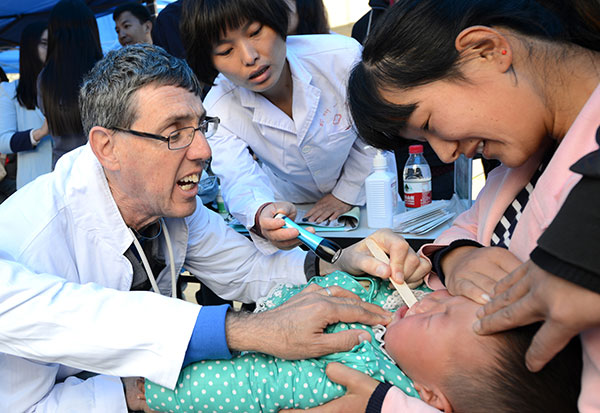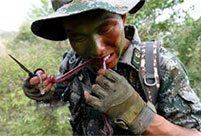


A child is treated by a US doctor in Zhengzhou, Henan province, in April as part of Operation Smile. Doctors working free have provided reconstructive surgery for 1,625 children with cleft lips and palates in China over the past 10 years.ZHANG TAO/CHINA DAILY
Nation's top legislature reviews draft laying down regulations for foreign service groups
When Xiaoxin, an 8-year-old boy, was diagnosed with congenital heart disease in June, his family was devastated.
But now the child, born to a rural family in Guizhou province, is recovering after undergoing successful surgery at Shanghai Children's Medical Center.
The boy's father said Xiaoxin (not his real name) had "come back from death".
"In my hometown, medical treatment was limited," said the father, surnamed Meng. "I heard that Shanghai Children's Medical Center had advanced technology to cure heart disease, so we took him there for treatment. Thank goodness, the operation was successful."
Meng said his son would be sent home in several days.
The case is just one example of the work of NGOs in China.
Now, government authorities and the NGOs hope to accomplish even more under proposed new legislation aimed at furthering the nonprofit groups' work.
The National People's Congress, China's top legislature, is reviewing a draft law on the management of overseas NGOs.
According to the draft, such NGOs may operate in China, and Chinese authorities must provide them with support, including policy consultation, operations guidance and preferential taxes. China will also reward NGOs that have made outstanding contributions to public welfare.
Shanghai Children's Medical Center is a joint program launched by the Shanghai municipal government and Project HOPE, an international healthcare group with headquarters in the United States. Since 1998, the center has successfully treated about 10,000 Chinese children diagnosed with heart disease and leukemia.
The center cured 97 percent of the children with congenital heart disease it treated, and 85 percent of the youngsters with leukemia have survived after treatment there.
Xu Lihua, director of Project HOPE's Shanghai office, who has been working in China for 15 years, said, "Our aim is to implement health education training worldwide and provide humanitarian support, promoting consistent development of the healthcare industry."
She said Project HOPE operates cooperation programs in all provinces and regions in China, providing medical equipment donations, vital research and medical personnel training.
Better services
Project HOPE is just one of thousands of overseas NGOs that have entered China since the country's reform and opening-up in the late 1970s, bringing in advanced technology, funding, talent and management skills.
Public Security Minister Guo Shengkun, speaking at a recent symposium on overseas NGOs, said, "China highly appreciates the contributions made by overseas nongovernmental organizations and will further support their friendly activities in China."
The symposium in Shanghai was attended by delegates from the Ministry of Foreign Affairs, the Ministry of Public Security and the Ministry of Civil Affairs, along with representatives of overseas NGOs and diplomats from the United States, Britain and Germany.
Guo said China will offer better services to foreign NGOs, which had been playing an important role in promoting the economy and developing society.
In recent years, overseas NGOs in China have cooperated with the country in many areas, including the economy, technology, education and healthcare, making great contributions to China's economic growth and social progress, he said.
Simon Stewart, a business consultant at the China-Britain Business Council's Shanghai office, said, "We have played a very good role as a bridge."
Since being founded 60 years ago, the council had set up 13 offices in China, he said. It had encouraged British enterprises to invest in China and create more opportunities for cooperation for companies in both countries.
The council also handles some government cooperation projects between China and Britain, he said.
Wang Cunkui, a professor of criminal investigation at People's Public Security University of China, said that with the support and efforts of overseas NGOs, China and nongovernmental groups will cooperate on a wider scale and benefit each other.
'Rule of law'
Apart from providing overseas NGOs with support and greater convenience, it is "more than necessary to strengthen the management and guidance of NGOs, and supervise them so they will conduct operations according to Chinese law", Wang said.
Li Wei, from the Beijing Lawyers Association, said, "The introduction of a new law will help the rapid development of overseas NGOs, guide them in abiding by Chinese laws and protect their legitimate rights in China."
But diplomats from the United States, Britain and Germany in Shanghai expressed concerns about the introduction of such a law, saying it may limit the effectiveness of overseas NGOs.
Xu Xianming, deputy director of the National People's Congress' Legal Affairs Committee, said: "China's reform and opening-up policy won't change even though such a law is introduced. Our aim is to seek a legal society, and drafting this law is considered an important step in strengthening the rule of law in China."
 Student proposes during graduation ceremony
Student proposes during graduation ceremony China-made special vehicles in exhibition
China-made special vehicles in exhibition Soldiers serving at Liaoning aircraft carrier
Soldiers serving at Liaoning aircraft carrier Bikini beauties lifeguards in river rafting place
Bikini beauties lifeguards in river rafting place PLA soldiers eat raw snake meat in harsh training
PLA soldiers eat raw snake meat in harsh training Kiss contest held in Nanning, SW China
Kiss contest held in Nanning, SW China Yunnan-Myanmar Road: The past and present
Yunnan-Myanmar Road: The past and present Photos of beautiful policewoman become online hit
Photos of beautiful policewoman become online hit Campus belle of Xiamen University gets popular online
Campus belle of Xiamen University gets popular online Gettin’ Bei-jiggy
Gettin’ Bei-jiggy Diplomats risk own lives for China’s future
Diplomats risk own lives for China’s future Infrastructure projects needed for stability: experts
Infrastructure projects needed for stability: experts Chinese student detained in Iraq freed, to return home soon
Chinese student detained in Iraq freed, to return home soonDay|Week